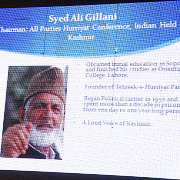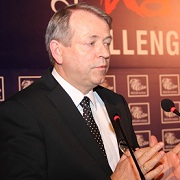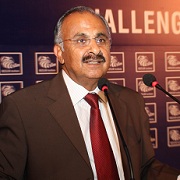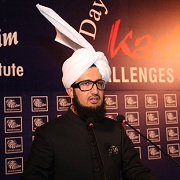CONCLUDING SESSION: Report of 2 Day International Conference on Kashmir: Challenges & Prospects
|
A two-day international conference on “Kashmir: Challenges and Prospects”, organized by the think tank MUSLIM Institute, was held at the Islamabad Club Islamabad on Wednesday & Thursday 26 & 27 March 2014. The conference was addressed by numerous Pakistani and international luminaries and experts on issues of global politics and international relations.
The report of fifth (concluding) session, among five different sessions of the conference, is given below.
|
|
|
Audio Link Address
Syed Ali Gillani
Chairman Tehreek-e-Hurriyat Jammu Kashmir
|
  |
We love to take care of Pakistan’s ideological and geographic frontiers and its stability more than our own lives. Allama Iqbal says to people of Arab in his Persian poetry, ”O man of insight, look at your times, recreate in your body the soul of ‘Hazrat Umar (RA). Power lies in the unity of the true religion, religion is strong will, sincerity and faith”. This is message for us and especially for politicians, leaders and intellectuals of Pakistan as well because Pakistan is center of hopes of the Muslim world. Many people of Pakistan think that they should have military, nuclear power to deal with India which is a large country. All these things really matter but until people of Pakistan and its leaders have power of faith, all these material powers will not benefit Pakistan. This is why Allama Iqbal calls that the real power is faith and all other powers are secondary. Every Pakistani citizen should have no fear of insecurity because it is a promise of Islam. Islam asks to secure all rights of all the citizens without any discrimination.
UN accepted Kashmir as disputed territory and that the people should be given right of self-determination. India herself promised to provide right of self-determination but by her military force occupied the territory. Since 1953 hundreds of processes of dialogue have been held but all have gone in vain. The basic reason of this is that Indian leadership on one side holds dialogue and on other side says it is integral part of India. In this situation dialogue cannot be fruitful. We don’t say for war, but until India accepts the disputed status of Kashmir, frees the prisoners, rolls back the black laws, provides the space to the Kashmiri leadership asking for right of self-determination and recognizes the basic right of self-determination, no dialogue can be fruitful. In Occupied Kashmir, women are being raped, thousands people disappeared, hundreds of thousands of orphans, about seven thousand unidentified graves, hundreds of thousands killed and these will never be allowed to go in vain. We will never accept any status quo or partition plan of Jammu Kashmir. Any solution other than implementation of UN resolutions for right of self-determination will not be accepted. Pakistani leadership must learn that any partition plan will not serve as the compensation of six hundred thousand lives and thousands of rapes.
Pakistan should improve its internal security situation. International lobby is involved in destabilizing Pakistan but unfortunately Pakistani leaders could not mention the foreign hands involved. Pakistan is center of our expectations and aspirations. Pakistan should show persistence and should not beg to any one for dialogue instead it should be on a level where it can assert its demand.
|
|
Recommendations of the Conference/ Wrap up of Sessions
Sahibzada Sultan Ahmad Ali
Chairman MUSLIM Institute
|
|
People from UK, Turkey, China, Netherland, Norway and Indian Held Kashmir have participated and presented their views in Conference. People from far distant areas across the globe took pain for Kashmiris and travelled to this region to participate in the conference. It is evident from this conference that hopes of Kashmiris are associated to Pakistan and we must fulfill their hopes because Kashmiris are suffering for the sake of Pakistan. Our full support should be with all the parties struggling for or involved in the freedom of Kashmir. Many recommendations, analysis and aspects were presented in the conference which will be presented to the Senate and Parliament of Pakistan. Few recommendations I will like to present here.
|
| I. |
Efforts must be made to lobby international community for recognizing its obligations for assisting in and ensuring a resolution and lasting settlement of the Kashmir dispute. |
| |
| II. |
UN Human Rights Commission and all international organizations advocating and overseeing human rights violations must monitor and ensure that India abides by the standards of international law in preserving and respecting the universally recognized fundamental human rights of the people of Kashmir. |
| |
| III. |
International treaty institutions must be pressed to take up the resolution of the Kashmir dispute in order to establish their credibility and effectiveness for preservation of global security. |
| |
| IV. |
The struggle of the Kashmiri people must be given due recognition as a legitimate struggle for their right of self-determination. |
| |
| V. |
Awareness on the Kashmir issue should be globally propagated on diplomatic and public forums as a recognized international dispute and steered clear of any association with terrorism. |
| |
| VI. |
Pakistani nation and government should continue every kind of diplomatic, moral and political support to Kashmiris till the right of self-determination is provided to them. |
| |
| VII. |
Pakistan should advocate India that solution of Kashmir dispute can provide it opportunities of trade as well as access to energy rich Central Asia which will help its economic growth. |
| |
| VIII. |
Convince US and the world that durable peace and security in the region is through a Solution of Kashmir Problem. |
| |
| IX. |
Media should play its role to show the real picture of determination of Kashmiri people for their basic right of self-determination. |
|
|
|
Guest Speech
Mr. Lars Rise
Former Parliamentarian, Norway
|
  |
I am here as Norwegian but also I stand here as Kashmiri. I will stand here on behalf of sufferings of people in Kashmir and want to give voice to the widows and orphans in Kashmir. Sixty seven years of unbelievable sufferings. I will urge everyone to do utmost to end these sufferings. Since sixteen years I have been contributing in conferences but if count how much we achieved in this period, it is depressing. People have spent their whole lives in struggle for their rights.
Twentieth century was worst in human history. Around one hundred eighty eight million people were killed during that century because of extreme ideologies mainly. Now in the new century we already have forty two wars and one of them is war in Kashmir which is still going on after sixty seven years. This is our main task to get this conflict on the main agenda of the international community. In Congo since 1995, more than five million people have been killed and suddenly this was on the top of agenda because of a BBC report and suddenly UN took notice of it. This is just an example that how one conflict comes on the top of agenda and this is we need to work and pray for Kashmir. Kashmir has the highest density of soldiers. It is potentially extreme dangerous conflict due to uniqueness of sharing border with three nuclear states.
It can only be resolved according to the will of people. It is clear that final way to just and solution of the conflict is the referendum that has been promised to them by international community. On June 15, 1962, the American representative to the United Nations, Adlai Stevenson, had stated, “The best approach is to take for a point of departure the area of common ground which exists between the parties. I refer of course to the resolutions which were accepted by both parties and which in essence provide for demilitarization of the territory and a plebiscite whereby the population may freely decide the future status of Jammu and Kashmir. This is in full conformity with the principle of the self-determination of people which is enshrined in Article 1 of the Charter as one of the key purposes for which the United Nations exists.” So disregard for resolutions has resulted in a horrible state of Kashmir, the war between India and Pakistan, nuclear and missile arm race in South Asia and horrible violations of human rights in the area. We can compare it with what we have seen on CNN in Bosnia, East Timor, and Kosovo and also for South Sudan but we don’t see same attention for Kashmir. Former secretary of Defense in US William Perry labeled Kashmir as the most dangerous nuclear hotspot on the planet. UN secretary general could use all power he has to solve this conflict.
I came to know about Kashmir issue when a Kashmiri approached me in 1997. I form Kashmir group in Norwegian parliament to focus the attention on this huge problem. It is very important to form unity among Kashmiris for the Kashmir case and one purpose. We need to include representatives of Kashmiris from all regions in every dialogue process on Kashmir. We know India is not interested in third party mediation as they say it is their internal problem. But in fact it is a huge problem, they are holding upto seven hundred thousand soldiers in Kashmir and coming in Srinagar is like coming in military fortress. In Iraq, US has one hundred and thirty thousand soldiers and that was on the top of agenda for five years. So someone from outside should mediate for dialogue for resolution of this issue.
|
|
Guest Speech
Lt. Gen. (R) Abdul Qayyum
Political & Defence Analyst
|
  |
In my perception there are four dangers regarding Kashmir issue. First is India refuses to accept UN resolutions and that is root of the issue. Secondly India is violating human rights and that compounds the issue. Third aspect is that due to Indian refusal of UN resolutions and violence against Muslims of Kashmir there is tension in Subcontinent because Pakistan is largest Muslim country around and Kashmir is part and parcel of Pakistan close to our heart, so we cannot bear that happening. That creates tension and as a result we have seen wars and now both are nuclear powers and there is danger of nuclear war. Fourth point is that the entire world is turning a blind eye towards this international humanitarian issue. World conscience is dead because if you have selective justice for certain areas and you ignore areas which deserve your attention that means there is no justice. It is just might is right approach. I will like to quote some examples. East Timor has total population of only 1.1 million and on their demand they were given separate country. Kosovo has about 2 million population and it is landlocked and NATO umbrella gave it independence. South Sudan has population of about 10-11 million which is less than Kashmir that has about sixteen million but their referendum was held and given independence. And recently we saw Crimea, although it was not under UN but it was merged to Russia because they opted to do so. But in case of Pakistan, in 1971India broke international laws but ignored by the world. Kashmir is as old as UN but no one is pushed and no body wants to solve because there are economic interests with India being a big market. If UN resolutions are not implemented, peace cannot come in this region.
We need to set our house in order at this time. Good governance, rule of law, internal unity, political stability, economic prosperity are very important to have sound foreign policy. Kashmir issue is political issue and we need to have strong foreign policy so that we are not isolated. Friendship with everyone, no aggression, following the UN Charter, promoting peace in the world and belief of right of self-determination everywhere were the highlights of foreign policy of Pakistan by Quaid-i-Azam given in 1948. We will give moral, political and diplomatic support to Kashmiri brothers and if we do it effectively, it will make lot of difference. Kashmir is our vital national interest.
|
|
Presidential Address
Hadhrat Sultan Muhammad Ali
Founding Father of MUSLIM Institute
|
  |
I hope that thoughts, analysis and recommendations presented in the conference will be helpful in guiding us towards practical solution of the Kashmir issue. I hope that MUSLIM Institute will continue to raise awareness on Kashmir issue and problems of Kashmiris on national and international level academically and intellectually.
There was a time when melodies of flowing water of springs and streams in Kashmir truly reflected its heaven on earth impression; thick green grass on mountains and white snow on peaks served as ornaments of the valley; fragrance of pine leaves mystified the environment. But today’s Kashmir is altogether different from that heaven on earth. Now there is no music except wails of bereaved mothers, young widows and orphan babies. Now grass on mountains hides graves of victims of genocide; blood of innocent victims of aggression seeps out of snow on peaks and pine leaves shed tears to mourn the same. It is a matter of shame and regret that all this is happening not in the Stone Age but in a period that is celebrated as age of civilization, prosperity, resourcefulness and institutionalism wherein all resources and energies are dedicated to eradicating threats to humanity. It is the age where world has been rendered into a global village and nations remain well aware of each other’s problems and also assist each other to solve the same. People of that heaven on earth have been facing worst human crisis for the last seven decades but unfortunately world treats it as “political conflict” and not “human crisis”. In very short words Kashmir is a knock on the conscience of the globalized world.
I salute the sacrifices of hundreds of thousands martyred Kashmiri for the sake of freedom. Tribute to their sacrifices for freedom struggle of about seven decades. Freedom movement cannot be suppressed by force as said by Iqbal about Kashmir; “The earth that enshrines in its bosom the fire of plane tree: this exalted earth can never be dead and cold”. And history is witnessed that this fact has made Kashmiri undefeatable. It is wrongly portrayed that Muslims of Occupied Kashmir are responsible for the situation in Kashmir whereas they are struggling for their right of self-determination in light of UN resolutions. In fact the presence of Indian army in Occupied Kashmir is root cause of all problems.
When international community is agreed that all the resources will be utilized for benefit of mankind and to stop any kind of violence, but if the basic problems like Kashmir remain unresolved, the international institutions remain only platform of moral and legal debate. Therefore it is duty of international community that the positive decisions made by international institutes should be practical in any case so that these can be accepted as unbiased and just. Thus the UN resolutions for right of self –determination in Kashmir should be implemented.
We should remember our jugular vein Kashmir every day of the year. The real plight of Kashmiris started when before formation of Pakistan on 17 July 1947, Kashmiris passed resolution to opt for Pakistan. Punishment of that decision has lead their first generation martyred, second is in jails and third is on roads struggling peacefully for their right of self-determination. Thus Pakistan and people of Pakistan should support struggle of right of self-determination of Kashmiris on diplomatic, moral and political platform.
|
|
|
At the end of the session conference memorabilia were presented to honorable speakers. Among representatives of all sections of society, the conference was attended by renowned analysts, professors and students of various universities, parliamentarians from the Provincial and National Assemblies, foreign diplomats, members of various research organizations and a large number of journalists and academics.
|
|
Download pdf
Newsletter
Share
Releated Publications